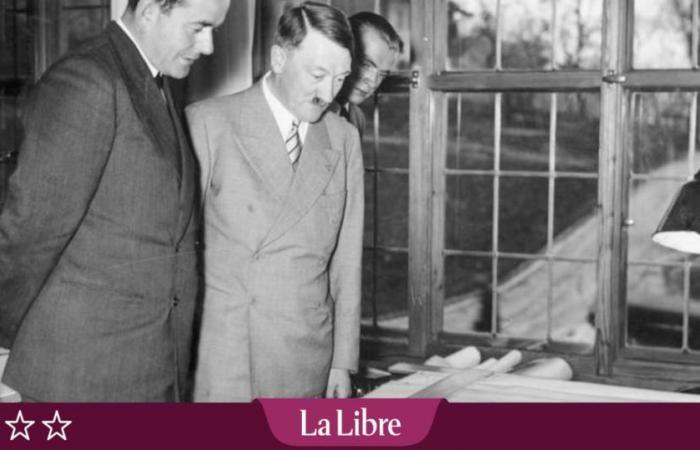
Upon leaving the fortress of Spandau, Speer published a memoir in 1969 entitled Au coeur du IIIe Reich (Fayard, 1971), whose sales and numerous translations ensured him a comfortable life until his death in London from a prison sentence. heart in 1981. He recounted, in particular, his closeness to Hitler and described the latter’s daily life, his vegetarian diet, his artistic tastes, his love of dogs and Viennese operettas, thus satisfying the curiosity of a wide public about the person responsible for the approximately 50 million deaths of the Second World War, including 6 million Jews and… 4 million Germans!
Who was Speer?
Who was Speer? Born in 1905 into a bourgeois family in Mannheim, an architect like his father, soon married and father of 6 children, he was 28 years old when he met Hitler to submit his staging project for the Nazi party congress in Nuremberg. The two men never left each other’s side. The man in power was passionate about architecture, the architect was hungry for power. Together, they dreamed of a monstrous transformation of Berlin, with an Arc de Triomphe 107 m high which would ridicule that of Paris, and a Hall capable of accommodating 180,000 people, topped with a dome culminating at 320 m. When Speer showed the models to his father, he exclaimed: “You have gone crazy!”
This intimacy between the Führer and Speer intrigued the novelist and film reviewer Jean-Noël Orengo to the point of devoting an essay to it, the title of which gives us the explanation. He found it in the words of a collaborator of Speer, Karl Maria Hottlage, an SS officer and jurist, who having seen the way in which Hitler had observed the architect commenting on the model of the future Berlin, said to him mischievously: “Do you know What are you, Speer? You are the Führer’s unhappy love.
The other big question remains about Speer: what did he know about the extermination of the Jews carried out by Himmler, the head of the Gestapo? There is no longer any doubt today that as Minister of Armaments and Industrial Production, who visited many construction sites, factories and work camps, he could not ignore the inhuman treatment to which they were subjected. the prisoners who were put to work there, nor the planned extermination of the Jews. He always proclaimed the opposite, even to the point of having convinced the British historian Gitta Sereny (1921-2012), who wanted to “confront evil” by meeting him and, although Jewish, became his friend…
Without compassion or empathy
To this ambiguous and mendacious figure of the Third Reich, Jean-Noël Orengo has therefore dedicated a work called “novel” which he presents as “a narrative and hybrid counter-fiction”, focused on an “artist-man of power couple” seen as a “terrible caricature of the tandem of Julius II and Michelangelo” in the 16th century. He multiplies the considerations in a narrative structure of 64 squares borrowed from the game of chess, and relies on a principle of repetition of sentences, images and words borrowed from serial music, as finely noted Raphaëlle Leyris in Le Monde. Notice to readers interested in literary technique. On the personality and place of Speer in the history of Nazi Germany, we will refer to the monumental biography by Martin Kitchen (640 pages, editions Perrin, 2017). There he will find this laconic appreciation of Father Athanase, of the Benedictine abbey of Maria Laach where Hitler’s former minister loved to attend services in his old days: “Passiration, compassion, sympathy, empathy did not part of his nature. Everything is said.
⇒ You are the Führer’s unhappy love | Novel | Jean-Noël Orengo | Grasset, 272 pp., €21, digital €15
EXTRACT
“In the Speer case, neither fiction nor autofiction lasts long, he beats us all upstream with his experience and his talent for disguising it.”





